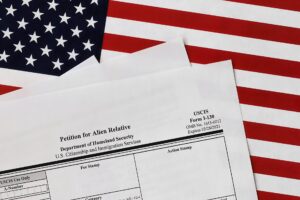At US-ILC, we listen, we care, we deliver: Let our 89 years of combined experience help you to navigate the complexities of immigration law!
The Department of State is set to launch a pilot program that will require foreign nationals from certain countries to post a bond of up to $15,000 when applying for B1/B2 visas. These types of visas are for applicants wishing to visit the U.S. temporarily for business or tourism purposes.
The visa bond pilot program will launch on August 20, 2025, and is expected to initially run for 12 months. It will not apply to those seeking other temporary visas, such as F, J, H, or O. According to the State Department, the justification for implementing a bond for B1/B2 tourist visas is to test the feasibility of establishing this type of bond for temporary visitors and determine if it helps to reduce overstays.
Who Will the B1/B2 Bond Affect?
The program will primarily target tourists from countries with a high visa overstay rate, or that the Department of State has determined to have insufficient vetting and screening processes. Nationals from Malawi and Zambia will be subjected to the bond when they apply for B1/B2 visas, although the list is expected to grow and face amendments throughout the 12-month program.
Applicants from countries with Citizenship by Investment programs, where nationals can buy U.S. citizenship with no residency requirement, will also be subjected to the bond. Overall, it will be at the discretion of consular officers to determine which visa applicants will be required to pay the bond.
How Will It Work?
Certain applicants for B1 or B2 visas will be required to post a bond of up to $15,000. The bond will be based on the amount of money that the consular officer has determined is sufficient to ensure that the visa applicant adheres to the rules governing their visa status and leaves the U.S. by the end of their authorized period of stay.
Visas issued under the bond will only be valid for single entries into the U.S. and have a shorter validity period than the average six months. Once the visitor has complied with the terms of their visa and returned to their country in a timely manner, they will be able to obtain a refund of the bond money.
Consequently, if the visitor overstays their visa, participates in employment while in the U.S., or violate their visa terms in any other way, they will forfeit the bond.
What Will It Mean?
A visa bond may deter visitors from poorer countries where people have lower incomes, since many potential applicants will not be able to pay the $5,000 to $15,000 bond, plus the other associated visa fees. The DOS also recently launched a visa integrity fee of $250 across all nonimmigrant visa categories, placing the total visa costs out of reach for many potential B1/B2 applicants.
The bond of up to $15,000 levied against tourists from some countries will also treat all nationals from that country as high-risk, regardless of their specific circumstances. Family members from affected countries who want to visit their loved ones in the U.S. may not be able to do so once the bond goes into effect. Imposing such a bond will also subject certain applicants to discriminatory practices on the part of consular officers.
Critics are also concerned about the effect that the program will have on tourism in the U.S., since there has already been a significant decline in visitors since the Trump administration took office. This bond may also impact cities that rely on international tourism to help support their local economies.
If you want to know how the bond for B1/B2 tourist visas may affect you, or if you have questions regarding another immigration matter, contact U.S. Immigration Law Counsel for a strategy session to discuss your case.




